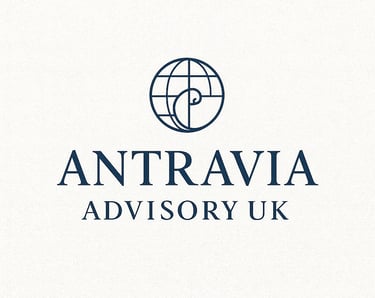PCI DSS 4.0 & Virtual Card Compliance for UK Travel Businesses | Antravia UK
Understand PCI DSS 4.0 for UK hotels and travel firms. Learn how virtual cards, MFA, and encryption protect your business under 2026 payment security rules.
TRAVEL FINANCE AND ACCOUNTING BLOG - U.K. FOCUS
11/9/20254 min read


PCI DSS 4.0 and Virtual Card Security for UK Hotels and Travel Companies in 2026
Link to full global version: Read the full PCI DSS 4.0 guide on PCI DSS 4.0 & VCC Security in 2026: The Compliance Playbook for Hotels and Travel Agencies
The travel industry runs on trust, and nowhere is that trust more tested than in payments. With PCI DSS 4.0 now fully enforced, UK hotels, tour operators, and travel agencies must align their systems and procedures with one of the most significant payment security reforms in a decade.
Why PCI DSS 4.0 is important to UK Travel Businesses
The Payment Card Industry Data Security Standard (PCI DSS) applies globally, but enforcement and guidance in the UK fall under UK Finance, Visa Europe, and Mastercard Europe, supported by the Information Commissioner’s Office (ICO) for data protection alignment.
From 31 March 2025, PCI DSS 4.0 replaced version 3.2.1, introducing continuous compliance, mandatory multi-factor authentication (MFA), daily tamper detection, and full encryption of all cardholder data. These rules now apply equally to UK-based cardholders and international guests using European processors or OTAs.
For hotels and travel firms, this is a commercial necessity. The average data breach in UK hospitality costs £3.8 million (IBM, 2025), and under both PCI DSS and the UK GDPR, cardholder breaches must be reported to acquirers and the ICO within 72 hours.
How it impacts Virtual Credit Cards (VCCs)
Virtual cards have become central to hotel and OTA operations. In the UK, over 50% of B2B payments between travel intermediaries now use VCCs (UK Finance, 2025). These cards simplify reconciliation, but they also extend the compliance perimeter. For more information on VCCs - Virtual Credit Cards in Travel: Accounting Risks and Opportunities
Under PCI DSS 4.0, VCCs must be encrypted, tokenised, and accessible only through systems with MFA protection. Storing card details in PMS exports, Excel spreadsheets, or even secure PDFs now breaches compliance.
For example:
A London hotel receiving VCCs via Expedia must ensure its PMS (e.g. Opera, Cloudbeds, or Mews) supports tokenized capture and never stores the full card number.
A tour operator invoicing via Stripe or Adyen must maintain a segmented cardholder data environment (CDE), where booking and communication systems are fully separated from payment infrastructure.
Even when the OTA or acquirer is PCI-certified, the merchant of record, the hotel or agency, remains responsible for secure data handling on its own systems.
EU Cross-Border Compliance
For operators selling into the EU, PCI DSS overlaps with GDPR Article 32 (Security of Processing) and the EU Payment Services Directive (PSD2). Both reinforce PCI principles such as encryption, strong customer authentication, and incident notification.
Many EU acquirers now refuse to process payments for merchants who cannot show ongoing PCI compliance. Hotels using shared service centres in Spain, Portugal, or Malta must also maintain data localisation safeguards to avoid cross-border exposure.
In practical terms, UK travel businesses should:
Conduct quarterly vulnerability scans and penetration tests.
Require acquirers and OTAs to provide PCI 4.0 certificates annually.
Maintain a self-assessment questionnaire (SAQ A or D) depending on payment method.
Update privacy policies to reflect card data retention limits and encryption practices.
Turning Compliance into Advantage
Complying with PCI DSS 4.0 may seem costly, but it pays back in reduced fraud, lower interchange fees, and stronger guest trust. Antravia’s analysis of UK travel clients shows that tokenized, compliant payment flows cut chargebacks by over 60% and shorten refund disputes by half.
More importantly, compliance demonstrates operational maturity which is a valuable differentiator for hotels seeking B2B partnerships with global OTAs or corporate travel programs.
How Antravia UK Can Help
Antravia UK works with hotels, tour operators, and agencies across the UK and Europe to implement PCI DSS 4.0 controls tailored for travel. Our advisory includes:
PCI 4.0 readiness assessments and gap analysis.
Virtual card tokenization setup and PMS integration.
Staff training and phishing simulations.
Annual compliance and audit support.
To discuss your 2026 compliance roadmap or request a free PCI scope review, contact info@antravia.co.uk or visit our PCI & Payment Security section.


References
PCI Security Standards Council – PCI DSS v4.0: Requirements and Testing Procedures (2024).
https://www.pcisecuritystandards.orgIBM – Cost of a Data Breach Report 2025 (Hospitality Sector Highlights).
UK Finance – Card Payments and Fraud 2025 Report.
Information Commissioner’s Office (ICO) – Guide to the UK GDPR: Security of Processing.
https://ico.org.uk/for-organisations/guide-to-data-protection/guide-to-the-uk-gdprAntravia Advisory – Global PCI 4.0 Travel Benchmarking Study, 2025.


Disclaimer
This article is provided for general information purposes only and does not constitute accounting, tax, or legal advice. Regulations, tax rules, and reporting requirements may change, and their application can vary depending on your business structure and circumstances. Readers should seek professional guidance from a qualified accountant or adviser before making any financial, tax, or compliance decisions. Antravia UK accepts no responsibility for any loss arising from reliance on the information contained herein.
Antravia Advisory UK
Where Travel Meets Smart Finance
Email:
Contact us:
© 2025. All rights reserved. | Disclaimer | Privacy Policy | Terms of Use | Accessibility Statement
© 2025 Part of the Antravia Group.
Antravia.com | Antravia.co.uk | Antravia.ae |
Finance.travel | Tax.travel | Consultancy.travel | VAT.travel | VAT.claims |
USSales.tax | EuroVAT.tax | UKVAT.tax |
contact@antravia.com
Antravia Ltd
71-75 Shelton Street
Covent Garden, London
WC2H 9JQ
United Kingdom
